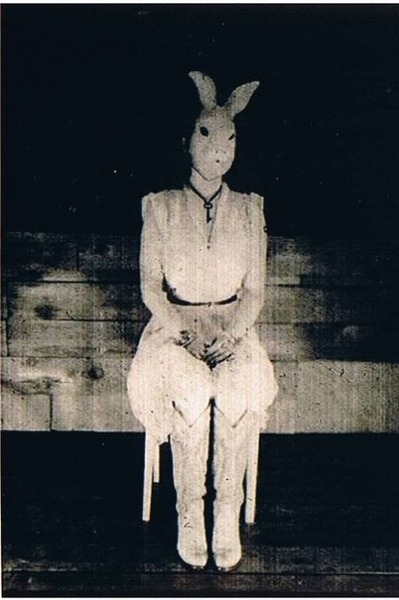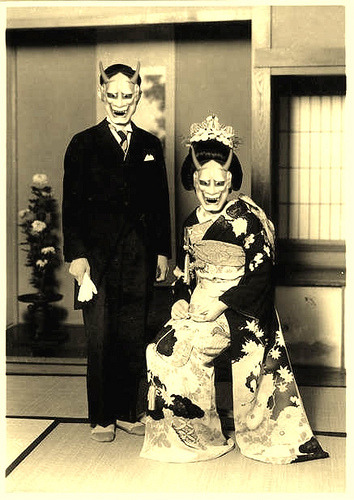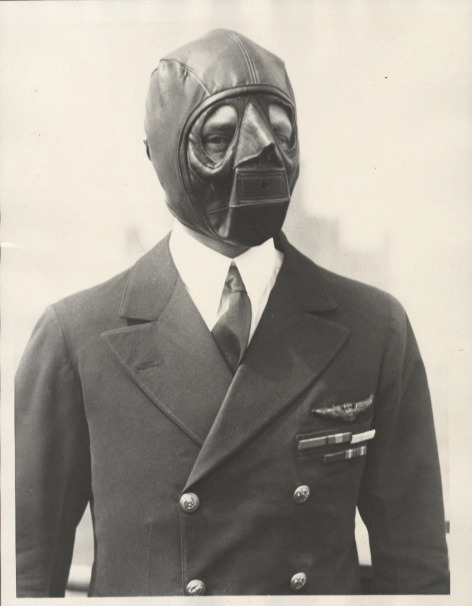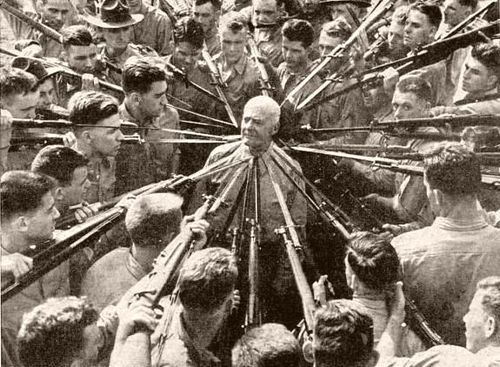Just puttering around with my Dark Sun conversion and decided to convert and post some of the more iconic monsters of the Dark Sun setting in Savage Worlds form. While I worked on that I noticed a lot of psionic powers/spells which are interesting and should certainly be converted but they don't have an easy Savage Worlds equivalent. So in addition to the monsters there are some new Savage Worlds powers inspired by the process. The powers on the monser entries marked with a * are new and are detailed at the end of the post.
Tuesday, April 24, 2012
Friday, April 13, 2012
Creepy Stuff
I'm getting ready to run a low-powered Dresden Files game which will hopefully include some good elements of horror and the bizarre. So I've been looking for good resources to spice things up and I figured I'd share what I found.
So if you need something to spark ideas for your own game or if you're just interested in some weird stuff then you should check out some of these places:
Black and WTF
If you haven't heard of this site it's a repository of strange black and white photos which range from the silly to the immensely creepy. Here's some good examples:

The Shadowlands
So long as you don't mind the mid-90's site design this website seems like a pretty useful collection of hauntings and spook stories throughout the US and beyond.
FreeSound
This doesn't have anything specifically to do with creepiness...but if you're running a game that features things like background noise or sound effects then this site is a great resource. Free sound clips of just about everything from gunfire to demonic screams.
Other Resources
Just some other suggestions for places to look for good, interesting material...
First, Mug Shot galleries. First and foremost you're probably not going to find a better collection of clear, diverse headshots out there. If you want to try and figure out what an NPC looks like just browse through any mugshot collection and you're bound to find someone who looks right. And of course they're great for finding people who look slightly crazy, if that's what you need. And since mugshots have been around quite a while you can easily find them for just about any recent decade to help set the mood for your game. Just make sure to trim out the police placard.
Also, find a local university or big college near where you want to set the game and do a quick google search with their name and "rare books collection". Just about every major university has one and they can have some pretty interesting specimens whether you're running a urban fantasy game or call of cthulhu.
So if you need something to spark ideas for your own game or if you're just interested in some weird stuff then you should check out some of these places:
Black and WTF
If you haven't heard of this site it's a repository of strange black and white photos which range from the silly to the immensely creepy. Here's some good examples:

The Shadowlands
So long as you don't mind the mid-90's site design this website seems like a pretty useful collection of hauntings and spook stories throughout the US and beyond.
FreeSound
This doesn't have anything specifically to do with creepiness...but if you're running a game that features things like background noise or sound effects then this site is a great resource. Free sound clips of just about everything from gunfire to demonic screams.
Other Resources
Just some other suggestions for places to look for good, interesting material...
First, Mug Shot galleries. First and foremost you're probably not going to find a better collection of clear, diverse headshots out there. If you want to try and figure out what an NPC looks like just browse through any mugshot collection and you're bound to find someone who looks right. And of course they're great for finding people who look slightly crazy, if that's what you need. And since mugshots have been around quite a while you can easily find them for just about any recent decade to help set the mood for your game. Just make sure to trim out the police placard.
Also, find a local university or big college near where you want to set the game and do a quick google search with their name and "rare books collection". Just about every major university has one and they can have some pretty interesting specimens whether you're running a urban fantasy game or call of cthulhu.
Thursday, April 5, 2012
This is awful
http://io9.com/5881462/publishers-destroy-scary-stories-to-tell-in-the-darks-amazing-artwork
I loved the art from the original scary stories books. Admittedly it's pretty messed up for kids...but look at me I'm hardly damaged at all. Hell, the art was what made those books interesting at all! Heck, it's the only reason I actually remember them and still own a set, otherwise it's just a collection of fairly forgettable ghost stories.
Don't get me wrong, the new art is far from terrible but it is not the nightmare fuel that the original was.
*Grumble* *grumble*
I loved the art from the original scary stories books. Admittedly it's pretty messed up for kids...but look at me I'm hardly damaged at all. Hell, the art was what made those books interesting at all! Heck, it's the only reason I actually remember them and still own a set, otherwise it's just a collection of fairly forgettable ghost stories.
Don't get me wrong, the new art is far from terrible but it is not the nightmare fuel that the original was.
*Grumble* *grumble*
Monday, April 2, 2012
Gaming Thoughts: Cosmic Aspects
So my second group has just finished up our Keep on the Plaplands adventure and they've decided that they're interested in running a slightly more serious game in a modern setting, so we're gearing up to run the Dresden Files RPG. So I've been going through the book to familiarize myself with it. I've always found FATE to be an interesting system but this is the first time for me to actually play or run the system. Anyway, while I was going through the book I had some interesting thoughts.
One of the central features of FATE is Aspects, these are player-determined character features which can be triggered by the player to receive a benefit or by the GM to inflict a penalty, appropriate to the nature of the aspect. For example, a character with an aspect like Big Guy could spend his fate points (the meta-currency of FATE) to get a bonus to things like punching folks, throwing their weight around, intimidating smaller folks or lifting heavy things. Likewise the GM could trigger the aspect to penalize the player for things like sneaking about, fitting through narrow spaces or being fast or graceful (this penalizes the player but gives them Fate Points). One of the possibilities presented in Dresden Files is the idea of "global" aspects that help flavor the themes of the entire campaign or scenario.
So here's my idea...cosmic aspects that rather than representing running themes or events instead represent the influence of fate or cosmic forces represented by common forms of Divination, namely the Tarot Deck.
Basically here's how it works...first you decide how "long" these cosmic influences last. You might decide that you'll "refresh" the influences every session, or maybe it'll set the tone for an entire scenario or adventure. Or perhaps the forces operate based on in-game time...re-dealing the cards every month at the full moon or some similar system. Once that's decided then you can start:
The Simple RPG Tarot Spread:
First you get an Tarot deck (or simply use any of the many online digital tarot programs). You'll probably want to simplify things by sticking with just the Major Arcana but if you want to get really detailed then the Minor Arcana might be an option as well. To find a straightforward interpretation of the various cards with minimum mumbo jumbo on wikipedia: the Major and the Minor.
Shuffle the deck and deal off the two top cards. These will be global aspects that apply to everyone in the game until new cards are dealt. The first card is always "upright" regardless of it's position when dealt, this card is the "Blessing". This means that the card's interpretation should always be looked at positively. The second card is always "reversed" and is the "Bane" and therefor is always interpreted in a negative manner. These cards apply to everyone in the game, PC and NPC but since the PCs are in many way the 'active' participants in the game then if you're not sure who the cards should affect then assume that it will favor (or curse for the Bane) the PCs. For instance, if the Blessing is the Emperor which represents organization, order, authority, leadership and so on. If both the PCs and the NPC are competing in a situation where the Emperor would be relevant (competing for a position or leading opposing forces against one another) then assume that the PC can invoke it for their own benefit (otherwise both might benefit equally and there would be no real effect). Likewise if the Bane could theoretically affect both PCs and NPCs at once assume that the PCs will be at the greater disadvantage.
After establishing the Global cards then have each player draw a card from the deck. These cards will be either upright or reversed depending on their orientation when the player turns the card over and reveals it. These cards will set the individual player's "fortune" until the cards are re-dealt.
So...mechanically how does all this work. In FATE these cards would essentially be aspects. Players may spend Fate Points to tag or invoke either of the Global card or their own cards for a reroll or a +2 bonus to their roll or it could be used to dictate plausible beneficial events or coincidences. Likewise the GM can offer the players Fate Points to invoke misfortunes upon them in the form of unpleasant events or spend his own Fate Points for his NPCs to benefit from the card in question.
And one of the great things about Aspects if they're so very easy to work into other games. If you're playing Savage Worlds then perhaps players can spend a Benny to "invoke" one of these Aspects for either a beneficial event or a bonus (instead of the standard reroll) like a +1d4 to a roll. If you're playing PDQ then you can spend a Style Dice (or a Fortune Point or whatever) to get a bigger-than-normal bonus (like an upshift) or directly penalize an enemy (or vice versa in the case of NPCs).
Even if you're playing a game that doesn't normally have meta-currency like Pathfinder or D+D then you can still perhaps invoke any of the cards for a reroll in an appropriate situation once per session per card. Likewise the GM could invoke a card against a PC once per session (either forcing them to reroll and taking the worst result or granting an opposing NPC a reroll).
And obviously this isn't limited to the Tarot either. Read your character's horoscope at the start of the game or whatever your superstition of choice is.
Subscribe to:
Comments (Atom)





